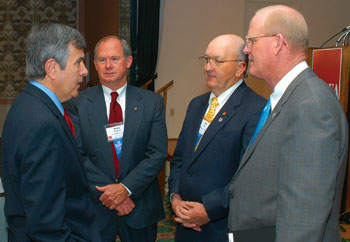Alabama Farmers Take Their Message To Washington

American farmers are being asked to help curb the national deficit through cuts in farm programs proposed in President Bush’s new budget. But many Alabama farmers believe that without those farm programs, agriculture will have a hard time surviving in their state.Secretary of Agriculture Mike Johanns spoke to more than 200 farmers attending the Alabama Farmers Federation’s annual Washington Legislative trip in the nation’s capital. He said he supports the president’s proposed budget, which includes cuts to farm programs.”The continued prosperity of agriculture depends on our ability to come to grips with the federal deficit,” Johanns said. “Nothing good comes to the farm economy by running deficits at this level.”However, Alabama Farmers Federation President Jerry Newby said the trip helped members of Congress and other national leaders realize the negative effects such cuts would have on Alabama farmers.”Our leaders are in the process of making decisions that will have long-range effects on agriculture in our country,” Newby said. “It’s also important that consumers understand that when they are talking about these cuts. The United States doesn’t want to become dependent on foreign countries for its food and fiber.”The Farm Bill acts as a multi-year contract for farmers who make long-range business and investment decisions. The current farm bill was written to last through 2007; however, the president’s proposal seeks to make program cuts prior to that time.Secretary Johanns told Alabama farmers that controlling the deficit was a priority for the president, adding that all areas of government will be asked to tighten their belts, including agriculture.Congressman Collin Peterson, D-Minn., the ranking Democrat on the House Agriculture Committee, spoke immediately after Johanns and took an opposing view on many of the positions addressed by the secretary.Peterson said the Farm Bill was a contract with farmers–and it isn’t fair to change the rules in the middle of the game. He encouraged Alabama farmers to seek support from their senators to block the president’s budget.Peterson said farm spending since 2002 is already $15 billion to $17 billion less than what was projected and that further cuts are unfair. “We’re not going along with any cuts, not even one dollar,” Peterson said about Democrats on the House Agriculture Committee.The speakers also disagreed on a recent court decision that delayed resumption of Canadian beef exports to the United States. Johanns said the decision to reopen the border was based on sound science, and that science indicates resumption of those imports is safe.Peterson said science was the basis for the judge’s ruling, which set aside a March 7 date to reopen Canadian borders. He said a cow from that country, which tested positive for bovine spongiform encephalopathy, was born two years after feed associated with the disease had been banned in Canada. He said further study is needed before allowing Canadian beef back into the United States.Johanns said he believes beef exports to Japan should resume soon, adding that he’s working with Japanese officials on a target date.Peterson, on the other hand, said Japan’s decision to continue to block U.S. beef into its country is both political and economic. He said prices for beef produced in Japan have skyrocketed since the ban went into effect, and many producers there have close ties with Japan’s agricultural leaders. Keeping American beef out, keeps their prices high, he said.Alabama farmers met with their congressmen during breakfast sessions where, in addition to the president’s proposed budgets, they discussed trade with Cuba. Alabama farmers could lose exports under a new interpretation of trade laws that requires cash-only transactions with Cuba. Prior to a recent ruling by the Treasury Department, Cuba paid for food and medical supplies shipped from the United States before they were unloaded in Havana. The department ruled items must be paid for before they leave port in America–a barrier that some farmers fear will send Cubans shopping elsewhere.Farmers also heard from John Maguire, senior vice president for Washington Operations of the National Cotton Council. He told Alabama farmers there is no chance of completely blocking a recent ruling by the World Trade Organization that said some American farm programs violate international trade rules.However, he said drastic changes may not be necessary, but added that the United States can’t “stonewall” the WTO’s decision on a complaint brought by Brazil, or that country may seek penalty tariffs against other American products.Sen. Saxby Chambliss, R-Ga., chairman of the Senate Agriculture Committee, addressed the Alabama group on March 17. He promised farm funding would not be cut disproportionately, and the Farm Bill, which expires in 2007, would not be reopened this year because of “an agreement” with President Bush.”We identified some general areas, nothing specific, but some general areas where we can achieve some savings, and it will not affect your bottom line,” Chambliss said, mentioning conservation programs that are not fully utilized and further streamlining of the food-stamp program.
